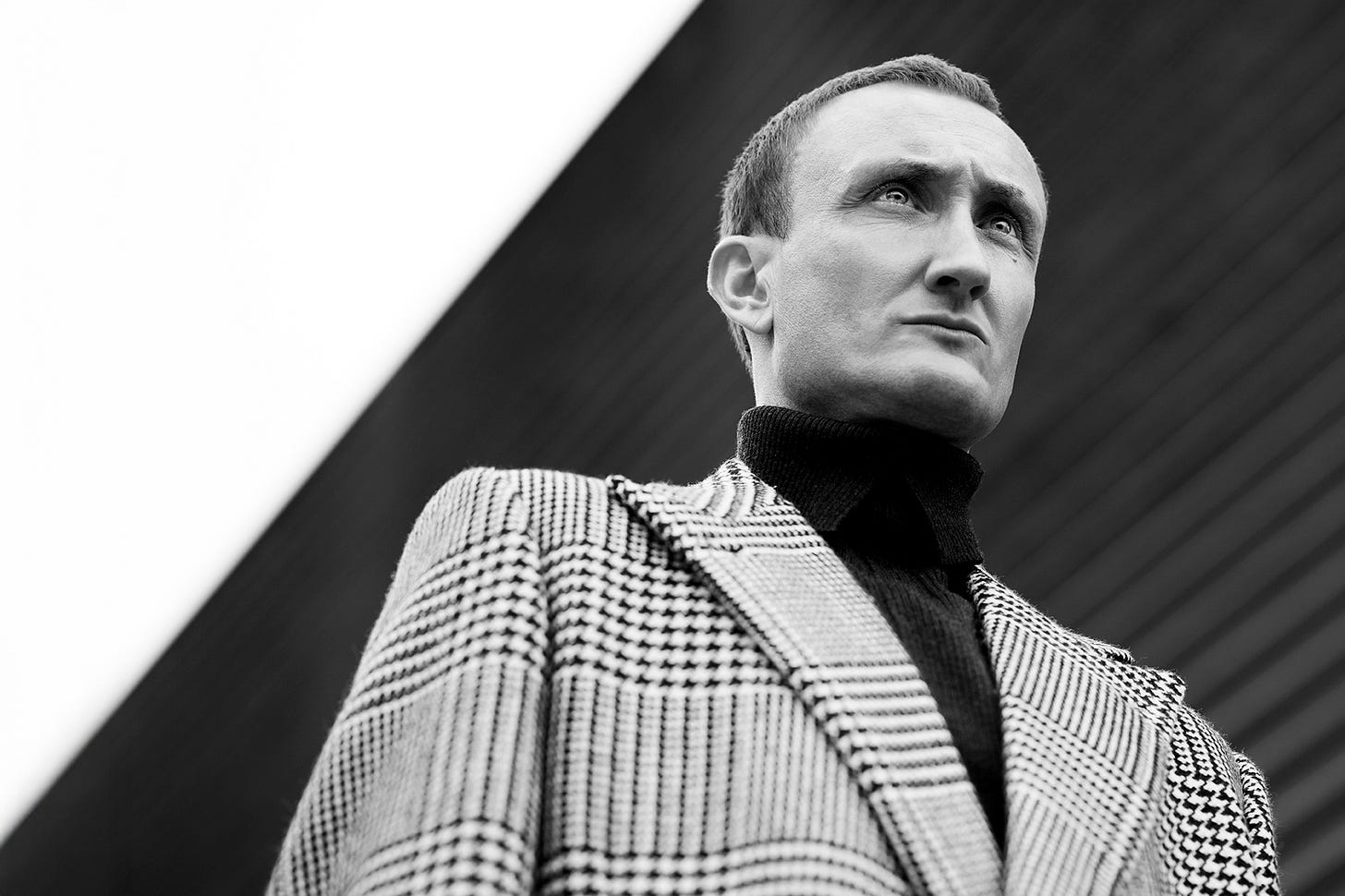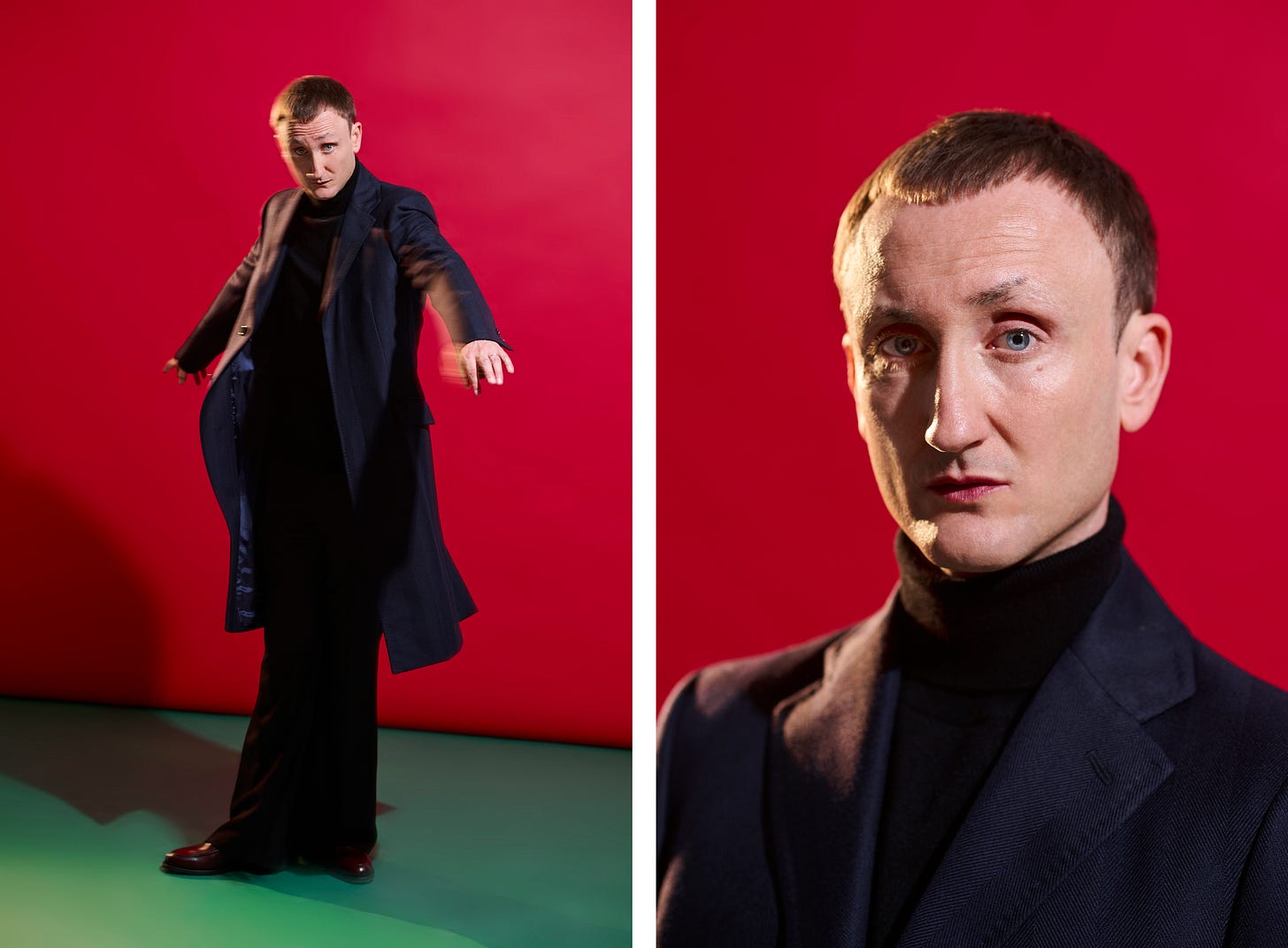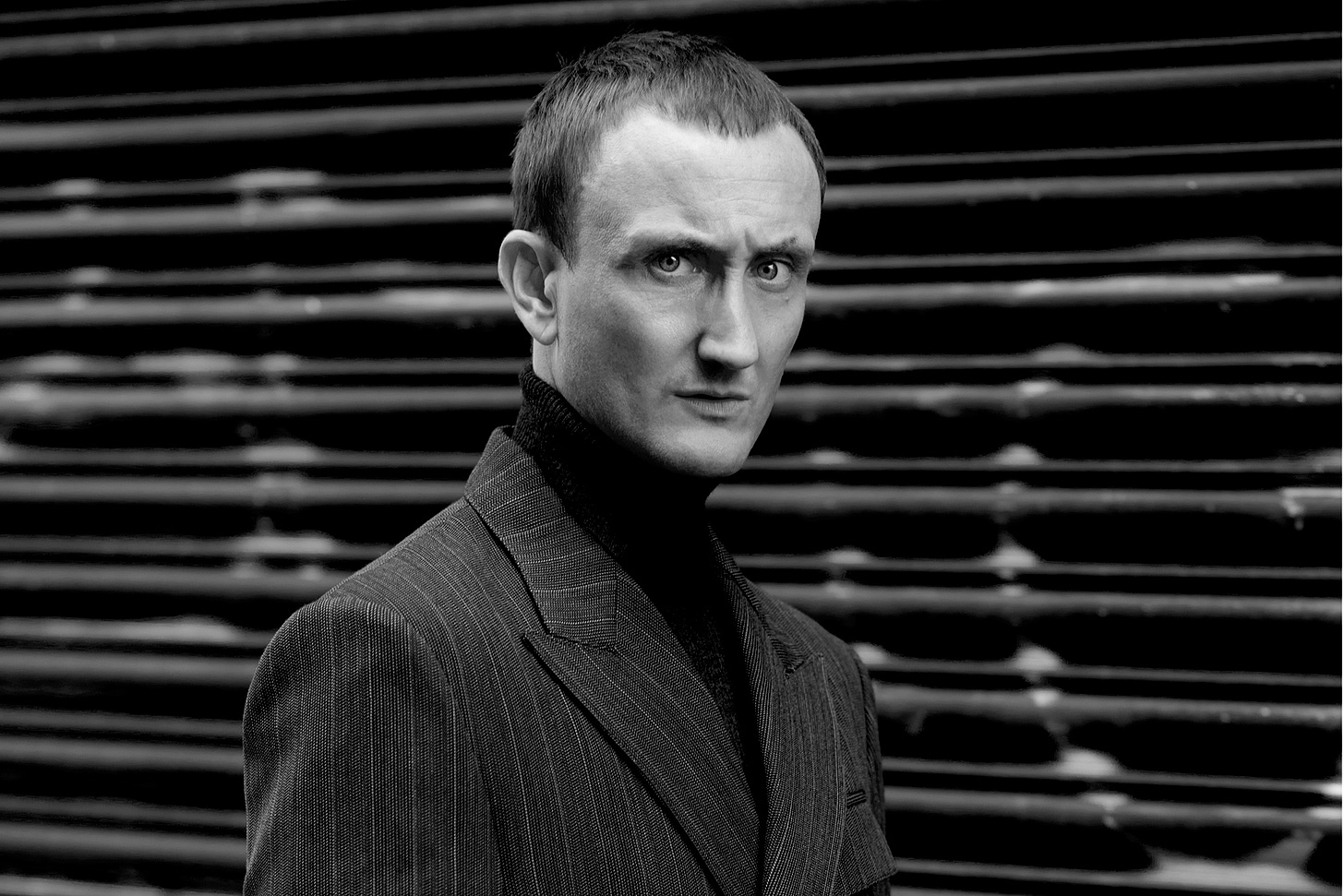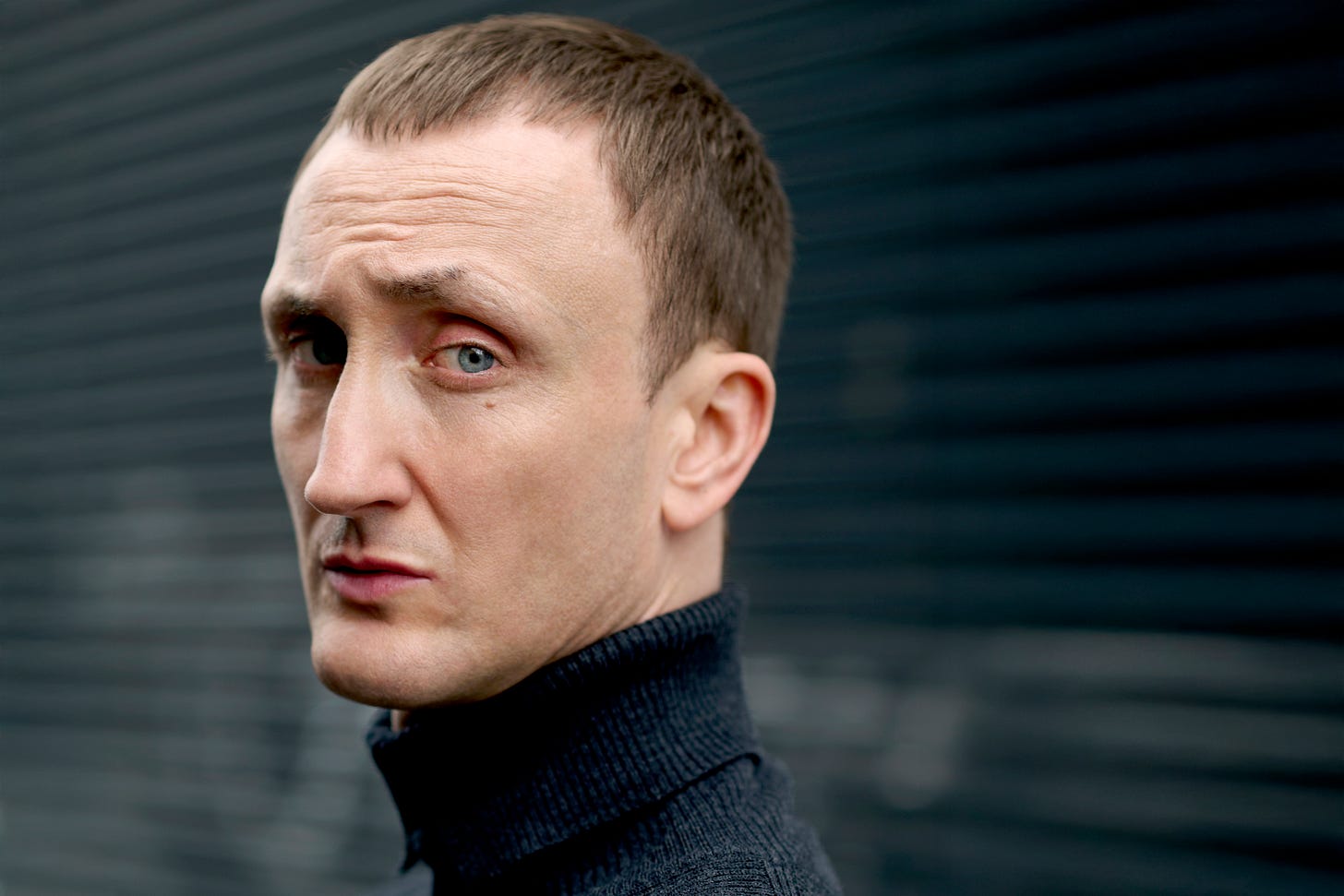Tom Brooke - All Hail the Hoodie
Tom Brooke skulks into Slow Horses Season 5 like a haunted hoodie left on the Tube—enigmatic, unnerving, and somehow stealing every scene without saying a word.
Portraits & Feature - Perry Curties at John Parkinson
Styling - Ella Gaskell
Grooming - Charlotte Yeomans
The long‐awaited fifth season of Slow Horses lands with that distinctive slap of icy humour and existential dread that has made Mick Herron’s world, via Apple TV+, one of the finest spy‐thriller presences on British television. It’s like Tinker Tailor Soldier Spy, if everyone in the Circus was hungover, emotionally repressed, and permanently exiled to a grey office near a bus garage near the Barbican.
Slow Horses has always been less about glamorised espionage than about the losers, outcasts and departmental detritus of MI5. These aren’t Bond types. These are the kind of people who forget their lunch in the microwave and refer to minor nervous breakdowns as “a bit of a wobble”. In Season 5, this motif intensifies. Lamb is grubbier. River is more lost. Roddy Ho is still inexplicably confident. And into this rich soup of dysfunction steps a character who somehow manages to make all the others look positively well-adjusted: J.K. Coe, played with haunted stillness by the always-interesting Tom Brooke.
Introduced last season and expanded in this one, Coe doesn’t so much arrive at Slough House as haunt it. Hoodie up, headphones on, eyes flicking to exits — he’s like a man trying to blend into a hedge. He’s the kind of character you’d find staring into a kettle wondering how to use it as a weapon.
This season, Coe has room to stretch. Not in the physical sense — he’s mostly hunched — but emotionally. As the Slough House crew are all pushed toward their psychological and professional limits, Coe’s arc could be the one that explores what happens when a highly trained operative becomes untethered – when the machinery that once governed one’s actions no longer functions, whether due to trauma, betrayal or sheer existential inertia.
Is loyalty to one’s country still meaningful when that country betrayed you, erased you, or simply forgot to log your existence on the shared drive?
And, crucially: what did happen to Coe before Slough House? Every character on this show has a scandal behind them, usually involving some combination of bureaucratic mishap, bad decisions and whisky. But Coe’s past feels different. More… surgical. Like his mistakes involved scalpels rather than spreadsheets. There’s something feral under the surface, something simmering — and Brooke plays it like a man permanently holding his breath.
What Brooke delivers here isn’t so much a performance as an atmosphere. While others deliver zingers, punches or both, Coe often just… stands. Watching. Calculating. Occasionally vibrating with barely-contained dread. He doesn’t act in the traditional sense — he radiates.
Brooke’s brilliance is that he trades in absence and suppression. In a genre where too many spies are all guns and growling, Coe’s most lethal weapon is what he doesn’t say. A wince here. A glance there. A moment where you’re unsure if he’s about to bolt or explode. And when he does speak — when the silence finally breaks — it lands like a slap from a clown at a kids birthday party.
One episode features a flash of Coe’s past — a story involving handcuffs, PTSD, and the kind of quiet cruelty that MI5 presumably has buried under a few non-disclosure agreements and a server room somewhere in Cheltenham. He tells it without blinking, without inflection. That’s the genius: it’s not performed trauma. It’s just… there. Stale and unfinished.
What makes Coe’s presence so valuable is how he contrasts with everyone around him. Lamb (Gary Oldman) is all bile and brilliance, gassing out corridors with snide barbs and leftover sausage rolls. River Cartwright (Jack Lowden) is full of hot young confusion. Roddy Ho remains the world’s most irritating incel-with-clearance. But Coe? He’s the whisper behind the wall. The silence in the conversation. The glitch in the matrix.
And in a show that thrives on dread and dysfunction, Coe might just be its moral fulcrum. He’s the one character who seems to know how broken everything is. Not just the system — but the people. Himself included. Maybe especially.
Tom Brooke has quietly been doing the rounds in top-tier British drama for years. He’s the guy you definitely recognise, possibly from The Crown, Bodyguard, Empire of Light, Sherlock, or Preacher — where he played an immortal angel with the general energy of a tired Victorian librarian. On stage, he’s been lauded for turns in Jerusalem and The Kitchen at the National Theatre, performances brimming with pathos, rage and that trademark Brooke weirdness.
Slow Horses Season 5 proves once again that this is the best spy show on television by being the least spy-like. It’s not about action sequences or plot twists (though there are plenty), but about what happens to the people who’ve been discarded by the system, and what they might still be capable of — or not.
Amid the show’s bruised brilliance, Tom Brooke’s J.K. Coe emerges as one of the most memorable additions yet. A slow-burning cipher with a hoodie and a haunted past, Coe is the character you can’t stop thinking about — even if he’d very much prefer it if you did.
By the end of the season, we probably still won’t know exactly who he is. But we know he matters. And if Slow Horses keeps going (and it should), Coe could end up being the soul of the show — or its cautionary tale. Or, maybe both.
Slow Horses is on Apple TV+ now.
Portraits & Feature - Perry Curties at John Parkinson
Styling - Ella Gaskell
Grooming - Charlotte Yeomans






